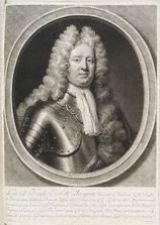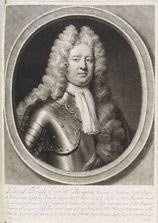
David Boyle, 1st Earl of Glasgow
Encyclopedia

The son of John Boyle of Kelburn
Kelburn Castle
Kelburn Castle is a large house near Fairlie, North Ayrshire, Scotland. It is the seat of the Earl of Glasgow. Originally built in the thirteenth century it was remodelled in the sixteenth century. In 1700 the first Earl made further extensions to the house in a manner not unlike a French château...
, Commissioner, and Marion Steuart, he was the Commissioner
Commissioner
Commissioner is in principle the title given to a member of a commission or to an individual who has been given a commission ....
(MP) to the Parliament of Scotland
Parliament of Scotland
The Parliament of Scotland, officially the Estates of Parliament, was the legislature of the Kingdom of Scotland. The unicameral parliament of Scotland is first found on record during the early 13th century, with the first meeting for which a primary source survives at...
from the Bute constituency from 1689–1699. He was raised to the Peerage of Scotland
Peerage of Scotland
The Peerage of Scotland is the division of the British Peerage for those peers created in the Kingdom of Scotland before 1707. With that year's Act of Union, the Kingdom of Scotland and the Kingdom of England were combined into the Kingdom of Great Britain, and a new Peerage of Great Britain was...
as Lord Boyle of Kelburn, Stewartoun, Cumbrae, Finnick, Largs
Largs
Largs is a town on the Firth of Clyde in North Ayrshire, Scotland, about from Glasgow. The original name means "the slopes" in Scottish Gaelic....
and Dalry on 31 January 1699, and advanced to the titles of Viscount of Kelburn and Earl of Glasgow
Earl of Glasgow
Earl of Glasgow is a title in the Peerage of Scotland. It was created in 1703 for David Boyle, Lord Boyle, one of the commissioners who negotiated the Treaty of Union uniting the Kingdom of England and the Kingdom of Scotland into the United Kingdom of Great Britain...
on 12 April 1703. After the Union
Acts of Union 1707
The Acts of Union were two Parliamentary Acts - the Union with Scotland Act passed in 1706 by the Parliament of England, and the Union with England Act passed in 1707 by the Parliament of Scotland - which put into effect the terms of the Treaty of Union that had been agreed on 22 July 1706,...
, he sat as a Scottish representative peer
Representative peer
In the United Kingdom, representative peers were those peers elected by the members of the Peerage of Scotland and the Peerage of Ireland to sit in the British House of Lords...
from 1707 to 1710.
He was Rector of Glasgow University
Rector of Glasgow University
The Lord Rector of the University of Glasgow is one of the most senior posts within that institution, elected every three years by students. The role of the Rector is to represent students to the senior management of the University and raise issues which concern them...
from 1690–1691 and was appointed Lord High Commissioner
Lord High Commissioner
Lord High Commissioner is the style of High Commissioners, i.e. direct representatives of the monarch, in three cases in the Kingdom of Scotland and the United Kingdom, two of which are no longer extant...
to the General Assembly of the Church of Scotland
General Assembly of the Church of Scotland
The General Assembly of the Church of Scotland is the sovereign and highest court of the Church of Scotland, and is thus the Church's governing body[1] An Introduction to Practice and Procedure in the Church of Scotland, A Gordon McGillivray, 2nd Edition .-Church courts:As a Presbyterian church,...
in 1706 and in 1707 to 1710. He was also Lord Clerk Register
Lord Clerk Register
The office of Lord Clerk Register is the oldest surviving Great Officer of State in Scotland, with origins in the 13th century.The Clerk-Register was from ancient times the principal Clerk in the kingdom, from whom all other clerks, whatever their government positions, and who were essentially his...
prior to 1714.

